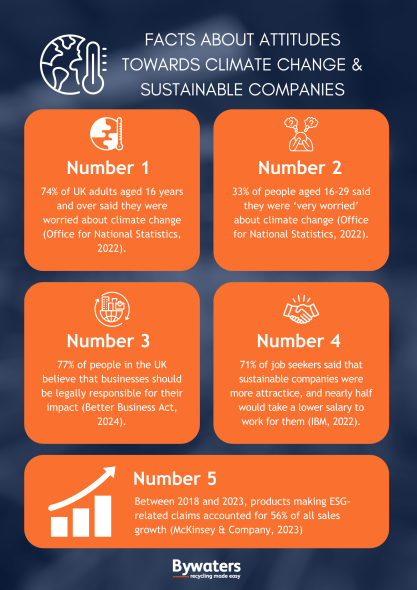Contact us today for your Free Quote
Climate change is big news, not just figuratively. The coverage of climate change has grown rapidly in recent years. In a study of news outlets spanning across eight countries, around 50% of people encounter news or information about climate change each week, a figure that has remained nearly unchanged from 2022, when it was 51%.
There’s no doubt that climate change awareness had a major impact on our society. However, did you know it’s also causing a rise in climate anxiety, a growing concern affecting mental well-being?
In a survey of 3,000 UK kids by Save the Children, 70% of respondents were concerned about the world they will inherit, while 60% of them also said that climate change and inequality are affecting child mental health.
This phenomenon isn’t new, and it has been a growing trend in recent years. In this article, we will go through what climate anxiety is, its implications and why it matters in the workplace.
What is climate anxiety?
Climate anxiety (also known as eco-anxiety) describes a persistent feeling of fear or distress about the Earth’s changing climate.
What are its symptoms?
Before we dive in, it is important to note that it is normal to feel manageable concern about alarming climate news. However, eco-anxiety can result in further symptoms.
Some of the symptoms of climate anxiety may vary depending on the person, some may include sleeplessness, headache, loss of appetite, or even panic attacks. Research suggests climate anxiety is becoming increasingly common, highlighting the need to understand this phenomenon better. Having said this, let’s look at some research to further understand the phenomenon.
Climate anxiety research
Climate anxiety only started to be studied extensively in the 2000s. We will delve into some of those findings in this section to discover more about social attitudes and the implications of these trends in the workplace.
How common is it in the UK?
Government surveys and other research
Relatively speaking, Britain tends to care quite a lot about the environment, as suggested by its consistently high-ranking environmental performance metrics. Having said this, UK Government surveys also state that as of 2022, climate change was a concern for 74% of respondents, changing only slightly from 75% in 2021.
With this in mind, it’s pretty evident that concern for the climate is established in the UK. However, comprehensive studies further suggest that some age groups are more engaged with the matter and more likely to experience climate anxiety than others.
Studies suggest that young people are more worried about climate change. A joint survey made by YouGov and Woodland Trust found that 31% of people aged between 16 and 24 were ‘very concerned’ about climate change, compared to 18% of people aged 65 and over. Trends and questions vary, but generally, research indicates that young people are more likely to be affected by climate anxiety.
Why it matters in the workplace
Climate anxiety isn’t just a personal concern, it can indirectly impact the workplace. With the previous studies in mind, there’s a growing case for its importance in the workplace.
Potential impact on productivity, wellbeing and engagement: As the role of discussing mental health in the office has increased over recent years, companies need to consider the potential of incorporating this seemingly widespread concern into the workplace’s mental health dialogue.
Around half of long-term sick leave is due to stress, depression or anxiety. Having said this, companies could address this matter about climate concerns effectively to potentially retain staff well-being and productivity.
Generational Impact: As discussed, studies show younger generations are particularly susceptible to climate anxiety. As Gen Z professionals enter the workforce in larger numbers, companies will need to address these concerns to contribute towards attracting and retaining top talent, especially when it is framed as a growing component of mental health dialogue. However, looking at it from a different perspective, it can also be a powerful opportunity to build a culture that is beneficial to the company.
The opportunity for employers
With this in mind and the aforementioned challenges it may indirectly pose in the office, there’s a real opportunity for workplaces to address this matter to build a positive culture in the workplace, as well as cultivate their CSR portfolio.
Activities to tackle climate anxiety in the workplace
There are many ways to cope with climate anxiety for individuals and the workplace. We will list a few ideas for activities to kickstart staff engagement with the matter.
Think about joining groups to talk about it
If you experience climate anxiety, it can help to join groups sharing the same issue. Talking about climate anxiety can help you feel less alone and more hopeful.
Consider joining an environmental initiative
It’s only normal to feel concerned for the environment at times; that’s why focusing on what you can control and taking part in an environmental initiative can have a positive impact. At Bywaters, we organise regular river and beach cleans to help tackle local pollution and keep London clean. They are open to everyone. If you live in London and would like to take part in a local initiative that makes a difference, contact us to find out more about our activities.
Incorporate a sustainability strategy in the workplace
Addressing climate anxiety isn’t just about environmental responsibility; it’s a smart business move.
Firstly, addressing this common concern with the aforementioned recommended activities can build a stronger workplace culture, built around addressing this common concern. This could even attract top talent to work for your business. An IBM survey suggests that 71% of job seekers thought that sustainable companies are more attractive employers, demonstrating that this preference is common.
Secondly, cultivating this programme can help to build a company’s CSR and accreditations, further building their company brand. Moreover, some insurance companies offer lower premiums to businesses with demonstrably strong sustainability and employee well-being programs, further incentivising this.
Lastly, incorporating an effective waste management programme as part of this strategy can benefit company finances directly as well. Recycling certain waste streams provides rebates on selected items, allowing companies to have a real advantage when managing their recyclables.
Having said this, Bywaters is a sustainable recycler, dedicated to making London’s businesses more sustainable. Our in-house Sustainability Team is dedicated to consulting you on eco-friendly strategies to help your business increase recycling rates or lower its carbon footprint. Click here to find out how our service can benefit you in advancing your sustainability strategy.

More posts:
Valentine’s Day: History, Tradition, and Its Modern Impact
This post traces the evolution of Valentine’s Day from ancient Roman rituals to a global commercial event. It highlights the holiday’s hidden environmental impact and offers a guide to celebrating sustainably through “Circular Romance” and waste reduction.
Read morePlastic Recycling: Why Are Some Types Harder to Process Than Others?
Some plastics recycle easily, while others are difficult or impractical to process at scale. This article explains why material type, packaging design, contamination and recycling infrastructure all play a role, and what businesses can do to improve plastic recycling outcomes in the UK.
Read moreThe Ultimate Guide For a Sustainable School and University
Download The Ultimate Guide For a Sustainable School or University. Get the roadmap to cut costs, reduce your carbon footprint, and boost your ESG profile with 5 core pillars.
Read more




